Nutrition and Supplementation for Optimal Brain Function and Repair
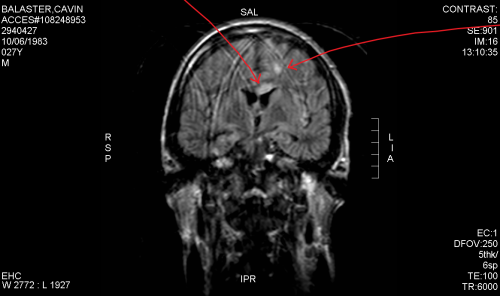
Leaky Gut Syndrome is a condition caused by increased permeability of the intestinal wall. In the scientific studies, it is usually referred to as “intestinal permeability” In fact, now you can put just about any condition into Google along with “Intestinal Permeability” and find hours of research papers associating the two. It’s incredible! Here are a few examples: 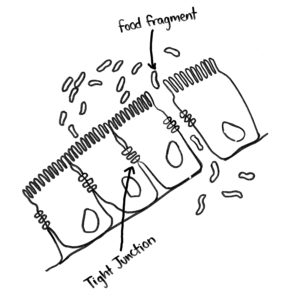
- Brain Injury
- Brain Disease
- Heart Disease
- Autoimmune Disease
- Irritable Bowel Syndrome
- Inflammatory Bowel Disease
- Acne
- Diabetes
- Multiple sclerosis
- Rheumatoid arthritis
- Lupus
- Vitiligo
- Narcolepsy
- Schizophrenia
- Autism
- Alzheimer’s Disease
- Parkinson’s Disease
- Depression
- Huntington’s
- Non-Hodgkin’s lymphoma
- Hypothyroidism
- Porphyria
- People who have been hospitalized and put on NSAIDs and antibiotics (and I had been on both for months) 2, 3.
Rebooting The Gut/Brain Axis
You may have heard about the gut/brain axis, but what exactly is it? The gut/brain axis is the bidirectional communication pathway between the gastrointestinal system and the brain. Nutrition and supplementation are cornerstone in restoring this communication and ensuring that the brain is getting the brain building nutrition to repair.
You see, our brain and body health is entirely dependent on the proper functioning of our digestive system. I mean… digestion is where the brain-building, brain repairing, and brain healing nutrients are extracted from our food. Without digestion working effectively, we aren’t getting the brain-building nutrients we want… including those nutrients in the supplements we are taking!
So we can eat the most perfect diet and take the most powerful supplements, but if our digestion is not doing its job well, it almost doesn’t matter because we aren’t extracting the nutrients in the food and supplements that we are eating and or brains are not getting the nutrition.
If we are not digesting the food and supplements we are eating, our brain is not getting those nutrients and instead, we are literally flushing it (and all the money we spend on it) down the toilet without absorbing the nutrients for optimal brain function and repair.
Building Bridges in the Brain
Since experiencing a severe traumatic brain injury, many connections in my brain have been damaged. I think of rebuilding these connections like building a bridge. In order to build a bridge we need 3 things:

- Skilled Workers (targeted therapy): Putting in the work and doing the right kind of targeted therapy to stimulate the growth of neuronal pathways is like enlisting skilled workers to build a bridge.
- Supplies (nutrition): Providing the brain and body with the right kind of brain building nutrition is like supplying those workers with adequate tools and building supplies. The nutrition we want to eat for optimal brain function and repair is covered in depth in my book, which is appropriately titled How To Feed a Brain: Nutrition for Optimal Brain Function and Repair.
- Delivery of supplies (digestion and circulation): In order to get the nutrients to the brain, we must effectively break down our food into nutrients that are packaged and transported in our blood to our brains. This is like having the vehicles and the roads to transport the supplies to the construction site.
We can have the best bridge architects, the most skilled designers, and the most seasoned workers (targeted therapy), but…
if we don’t provide the right supplies and tools (nutrition), or…
if we don’t get those supplies to the construction site (digestion and circulation)…
A bridge, or new pathways in the brain, are not very well supported or established.
- Ensure Proper Digestion in The Mouth and Stomach
- Quell Brain Inflammation (and brain fog)
- Support the Immune System
- Ensure Gut Barrier Integrity
We start by following the digestive system from our ingestion of food in our mouths, through our stomach, then into our intestines, where the nutrients are extracted and what’s left over is excreted. The nutrition that is extracted from our food then enters the bloodstream, where the circulatory system takes those nutrients and delivers them throughout the body. In each of these steps, we can have problems, which affect the downstream steps, and can hinder our ability to get the brain building nutrition we need. Let’s take a look at each of these steps, see what can go wrong and find means to improve this process.
Step 1. Ensure Proper Digestion in The Mouth and Stomach
There are several steps that we want to take to ensure that our digestion is functioning optimally, and the very first step of this is in ensuring that we are getting breaking down the food from our mouth and stomach. If we are to follow the pathway of our digestion, it starts in the mouth.
The Mouth: Where It All Begins
As we take that first bite, digestion commences with mastication, AKA chewing. During mastication our food undergoes both mechanical and chemical processing. During this step, we are physically cutting and breaking down the food into smaller pieces, increasing the surface area of the food, and The salivary glands secrete saliva and add it to the mixture. This begins the chemical digestion through the presence of enzymes.
Enzymes are protein molecules that act as catalysts in biological reactions. In other words, they facilitate chemical reactions, breaking down food into nutrients that our body can then utilize.
One essential enzyme found in saliva is amylase. Amylase initiates the breakdown of complex carbohydrates, such as starches, into simpler sugars like maltose. Through thorough chewing, mixing food with saliva, and allowing amylase to work its magic, the digestive process begins to unlock the energy trapped within our food.
The Mighty Stomach: A Force to be Reckoned With
After the food leaves the mouth and travels down the esophagus, it enters the stomach, a muscular organ that plays a central role in digestion. The stomach is a truly remarkable and powerful organ, equipped with unique abilities to process and prepare food for further breakdown.
One of the stomach’s remarkable features is its extremely acidic environment. The stomach lining secretes hydrochloric acid (HCl), which helps create an acidic pH as low as 1.5-3. This highly acidic environment would burn through your skin, tut the stomach is able to handle this extreme environment because it is coated with a thick mucus membrane.
But ya know what isn’t coated with a thick mucus membrane? Your food!
This extremely acidic environment not only breaks down your food, but it also activates different enzymes that are released into your stomach like pepsinogen, the precursor to pepsin, which is responsible for the breakdown of proteins. And for pepsinogen to become pepsin, and to breakdown proteins, it requires a very acidic environment. Additionally, this acidic environment denatures proteins, unfolding their complex structure and making them more accessible to pepsin.
So me need a very acidic environment in the stomach, and we need enzymes to break down our food!
And while stomach acid (HCL) and enzymes are being secreted, the stomach’s muscular walls contract and churn the food, mixing it with gastric juices. This churning action transforms the food into a thick, paste-like mass called chyme. The vigorous contractions of the stomach muscles not only aid in further mechanical breakdown but also ensure thorough mixing of the food with digestive enzymes and gastric juices.
What if This Isn’t Working Optimally and What Can We Do to Fix it??
If our stomach and mouth are not doing it’s job well, then all the downstream extraction of nutrients are not able to do their job well. This is very individual and so I have developed a quiz that you can take to find out how your digestion is doing (coming soon).
The first thing we can do is to make sure we are chewing our food. We also want to ensure we are producing enough saliva. We also want to ensure that we are getting the enzymes that are needed for proper digestion. We can supplement digestive enzymes, which are important throughout the digestion of our food. And one of the greatest aspects of digestive enzymes because they are well tolerated, even in large doses. And when I say “large doses,” I mean VERY large doses! In fact there is a protocol to treat cancer that has been successful using enzymes at VERY high doses (up to 160 capsules) without food with no adverse effects!
Digestive Enzymes
Digestive enzymes, such as amylase, protease, and lipase, aid in the breakdown and absorption of macronutrients. The thing is that sometimes our bodies do not produce the enzymes we need for proper digestion. There are several reasons we might not be producing enough enzymes to meet our bodies’ needs for optimal digestion. In cases of inflammation, the body’s production of digestive enzymes may be impaired. And…a deficiency in essential vitamins and minerals also effects the production of digestive enzymes. And because of this reduced enzyme production, the nutrition we eat is not absorbed, so the vitamins and minerals we need to produce the enzymes are not supplied. This is one of those vicious cycles of impaired digestion and malnourishment that gets worse and worse until properly addressed. Learn more in our article about digestive enzymes.
Besides digestive enzymes, we also want to look at stomach acid, specifically known as hydrochloric acid or HCL.
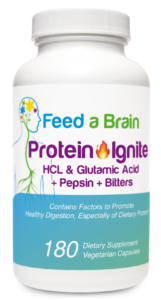 Hydrochloric Acid (HCL)
Hydrochloric Acid (HCL)
Stomach acid plays a vital role in the process of digestion, enabling us to extract the nutrients necessary for optimal brain function and repair. It serves several crucial functions, such as breaking down proteins into amino acids, activating digestive enzymes, and killing harmful bacteria and pathogens present in our food. When our stomach acid levels are imbalanced or insufficient, it can lead to various digestive issues and hinder nutrient absorption. One way to troubleshoot this problem is through hydrochloric acid (HCL) supplementation.
2. Quell Brain Inflammation (and brain fog)
Certain supplements, known for their potent antioxidant properties, have demonstrated the ability to cross the blood-brain barrier and provide neuroprotective benefits. Let’s explore some of these remarkable supplements, including N-N-Acetyl L-Cysteine, DHA, bioavailable turmeric (curcumin), resveratrol, phosphatidylserine and phosphatidylcholine, and melatonin, and discuss their role in quelling inflammation and supporting neuronal pathway rebuilding.
N-Acetyl L-Cysteine (NAC)
NAC is a powerful antioxidant that increases glutathione levels, the body’s master antioxidant. By neutralizing free radicals, NAC helps reduce oxidative stress and inflammation in the brain. Additionally, NAC supports the production of neurotransmitters like glutamate and dopamine, which are crucial for cognitive function and mood regulation. Studies have shown that NAC can mitigate neuroinflammation and even protect against neurodegenerative diseases like Alzheimer’s and Parkinson’s.4 You can see more research from our research roundup on NAC.
Docosahexaenoic Acid (DHA)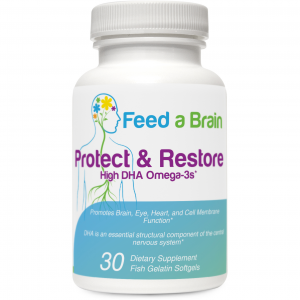
DHA, an omega-3 fatty acid, is an essential component of brain cell membranes. It possesses strong anti-inflammatory properties and aids in maintaining optimal brain structure and function. DHA supplementation has been associated with improved cognitive performance, reduced risk of neurodegenerative disorders, and enhanced neuroplasticity. Its ability to cross the blood-brain barrier makes it an excellent candidate for supporting the rebuilding of neuronal pathways. You can learn more from our article on DHA.
Bioavailable Turmeric
Curcumin, the active compound in turmeric, exhibits potent antioxidant and anti-inflammatory effects. However, curcumin’s bioavailability is limited. To address this, bioavailable turmeric formulations, such as those incorporating piperine (found in black pepper), have been developed to enhance absorption. Curcumin’s ability to reduce inflammation and oxidative stress in the brain makes it a promising supplement for neuroprotection and supporting neuroplasticity.
Resveratrol
Resveratrol, commonly found in grapes and berries, is a polyphenol with antioxidant and anti-inflammatory properties. It activates several cellular pathways that promote neuroprotection and supports the rebuilding of neuronal connections. Resveratrol has shown promise in improving cognitive function and may have a positive impact on neurodegenerative diseases such as Alzheimer’s and Huntington’s disease.
Phosphatidylserine and Phosphatidylcholine
Phosphatidylserine (PS) and phosphatidylcholine (PC) are essential phospholipids that make up the cell membranes of neurons. They contribute to the integrity and fluidity of cell membranes, aiding in neuronal communication and signal transmission. PS and PC supplementation has been associated with improved memory, attention, and overall cognitive function. Their ability to cross the blood-brain barrier makes them valuable for supporting the rebuilding of neuronal pathways and maintaining brain health.
Melatonin
While primarily known for its role in regulating sleep-wake cycles, melatonin also a highly efficient free radical scavenger and general antioxidant. Unfortunately, brain injury survivors exhibit reduced melatonin levels after an injury 5, 6. It helps combat oxidative stress in the brain, reducing neuroinflammation and supporting neural repair processes. Melatonin supplementation may contribute to improved cognitive function and protect against neurodegenerative diseases.7
While these compounds can be used to reduce the inflammation, it is especially important to eliminate the source by cleaning up the diet. After removing packaged and processed foods, I removed common inflammatories. This included gluten, dairy, eggs, nuts, refined sugar, soy, shellfish, and most grains, and introducing foods that had the nutrients I needed to feed my brain. I wrote How To Feed a Brain: Nutrition for Optimal Brain Function and Repair to outline exactly what that nutrition consisted of.
3. Support the Immune System
While practicing an elimination protocol and supplementing to quell the inflammation, next we would look towards immune support. A robust immune system is vital for overall health and plays a crucial role in healing the digestive system and supporting brain function. Supplements have shown promise in bolstering the brain and body’s immunity include spore-based probiotics, emulsified vitamin D, liposomal vitamin C, colostrum PRP, and fat-soluble vitamins A (as retinol). These compounds would help to boost my immune system, and, because about 70% of the entire immune system is found in the intestinal tract 8, they would also work to support my digestion.
Spore-Based Probiotics:
Probiotics are beneficial bacteria that contribute to a healthy gut microbiome. Spore-based probiotics, such as Bacillus strains, have unique characteristics that make them particularly effective. These spore-forming bacteria have a protective outer shell, enabling them to survive the harsh environment of the digestive system and reach the intestines intact. By promoting a balanced gut flora, spore-based probiotics support immune function, improve digestion, and reduce inflammation, which can positively impact brain health.
Emulsified Vitamin D3 + K2
Vitamin D is well-known for its crucial role in immune function, but it also supports gut health and brain function. When combined with vitamin K2, which aids in calcium metabolism, Emulsified Vitamin D3 + K2 provides a synergistic effect. Vitamin D promotes the production of antimicrobial peptides in the gut, strengthening the intestinal barrier and reducing inflammation. Moreover, it supports the synthesis of neurotransmitters, contributing to optimal brain function and repair.
Liposomal Vitamin C
Vitamin C is renowned for its immune-boosting properties and antioxidant benefits. Liposomal vitamin C formulations utilize microscopic fat-based particles to improve absorption and bioavailability. This powerful antioxidant aids in neutralizing harmful free radicals, reducing inflammation, and supporting the immune system. By promoting a healthy gut environment, liposomal vitamin C can aid in digestion and support brain healing by reducing oxidative stress.
Colostrum PRP
Colostrum is the nutrient-rich fluid produced by mammals shortly after giving birth. It contains a variety of immune-boosting components, including Proline-Rich Polypeptides (PRPs). Colostrum PRPs help modulate the immune system, promoting balanced immune responses and reducing inflammation. Improved digestive health is often observed with colostrum supplementation due to its ability to support gut integrity and promote the growth of beneficial gut bacteria. Additionally, colostrum’s bioactive compounds have been found to support brain health and facilitate healing processes.
Emulsified Vitamin A (as retinol)
Fat-soluble vitamins, such as vitamin A, are crucial for immune function and overall well-being. Vitamin A, particularly in the form of retinol, supports the development and maintenance of healthy mucosal tissues, including those lining the digestive tract. It promotes the production of immune cells and antibodies, helping to combat infections and inflammation. Furthermore, vitamin A plays a vital role in neuronal development and brain function, supporting cognitive health.
4. Restore Gut Barrier Integrity
Of course, we would also want to provide additional support to the healing process of my inflamed intestine. Several supplements known for their potential to alleviate inflammation and promote gut healing. Included among these are L-Glutamine, licorice root, aloe vera, marshmallow root, and slippery elm bark. All of these and more are included in Designs for Health – GI Revive.
Other than the digestive enzymes, all of these and more are included in Designs for Health – GI Revive
L-Glutamine
L-Glutamine is an amino acid that plays a crucial role in maintaining intestinal health. It is the preferred fuel source for the cells lining the intestinal wall. Supplementing with L-Glutamine has been shown to strengthen the integrity of the intestinal barrier, reduce inflammation, and support tissue repair in the gut.
Licorice Root
Licorice root contains compounds such as glycyrrhizic acid and flavonoids, which possess anti-inflammatory and antioxidant properties. These compounds have demonstrated the ability to soothe and protect the gut lining. Licorice root can help alleviate symptoms of gastrointestinal inflammation, including acid reflux, ulcers, and leaky gut syndrome.
Aloe Vera
Aloe vera has long been valued for its medicinal properties, including its ability to promote digestive health. Its gel contains anti-inflammatory compounds, such as acemannan, that help reduce gut inflammation and support tissue healing. Aloe vera also aids in soothing and lubricating the intestinal lining, promoting proper digestion and nutrient absorption.
Marshmallow Root
Marshmallow root contains mucilage, a substance that forms a protective layer on the digestive tract’s lining. This layer helps soothe inflammation and irritation, reducing discomfort and promoting healing. Marshmallow root is often used to alleviate symptoms of conditions like gastritis, ulcerative colitis, and irritable bowel syndrome (IBS).
Slippery Elm Bark
Slippery elm bark has been traditionally used to soothe gastrointestinal issues. It forms a gel-like substance when mixed with water, which coats the digestive tract, providing a protective barrier against inflammation and irritation. Slippery elm bark has been shown to relieve symptoms of conditions like acid reflux, inflammatory bowel disease (IBD), and gastritis.
I always like to get my nutrients from food, so after using the supplements above for quite some time, I began making bone broth because it is also an extremely powerful food for healing the gut and the brain. I now am a huge fan of Broth Masters broth, and you can get $15 off your order by using the code: feedabrain.
There is certainly no cookie cutter approach to brain injury rehabilitation, but there may be a common starting point for a successful recovery. One of the most pivotal realizations that I made surrounding my injury was that there are ways that I could nutritionally support my neuronal health at a cellular level, and thereby support brain plasticity, but I also had to heal my digestion so that I could absorb the nutrients for my neuronal health. I did so through nutrition and supplementation.
Learn how to supplement your brain by downloading my free supplement guide for brain enhancement.
This post was originally used as a guest blog at JoshGitalis.com

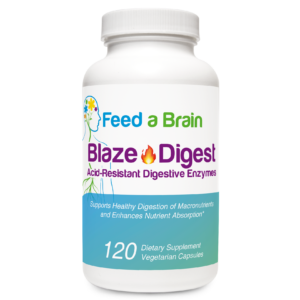
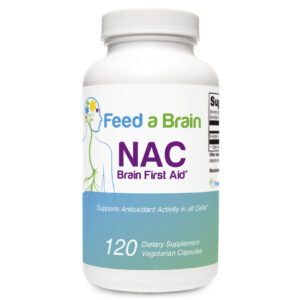
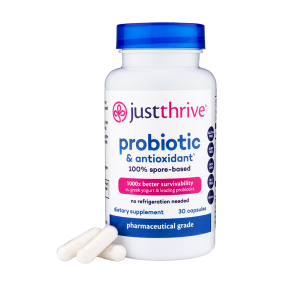
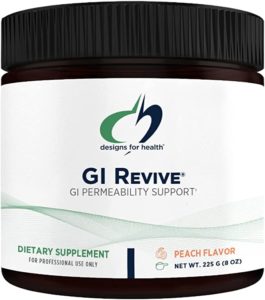

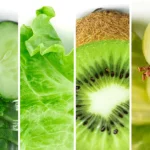

Comments
Ok, Ok, I’ll go eat more bacon now!
keep up the good work, Cavin!
You’re the best, Amy! I’ll keep it up if you do! Together, we’re doing good things. 🙂
Wow– I have been making nutrition and gut-health a cornerstone of my son’s recovery from a DAI/severe TBI–your article is the first one I’ve seen to address this. Awesome–and Kudos to you Cavin! (I have a stepson named Cavin too!). Thank you for your post–I will definitely be following you. I’m challenged at times because of the struggles my son has with swallowing–but have been gradually getting closer to a vegan.live-food based diet for him. I have worked hard to keep his diet organic, gluten free and and as much live, real food as possible. Supplementation is huge as well–and I will be following up on some of your ideas that I have not implemented yet. I just wanted to complement you on your vision, dedication, knowledge and willingness to educate others. #StayStrong
Karen,
I don’t know how I missed this, but I have to thank you so much! This means so much. Stay tuned for more info and YOU #StayStrong too! 🙂
oops–I had autocorrect changed my email address–here is the correct one for your comments section:
No problem, Karen!
Just in case it didn’t reach you, I wanted to thank you for the kind words. Another Cavin?! That’s so cool! Say hi for me!
I understand how it can be challenging. My swallowing is difficult too! I’m surprised at the lack of nutritional information in regard to brain injury and gut health. I view it as fundamental to a strong recovery for many reasons, and I’m glad to hear you’ve adopted that mindset as well!
I will continued to update more about supplementation and nutrition, and I’m pleased to know you’re in this community!
This article hits the nail on the head for me. I’ve spent the last 15 years recovering from a TBI, and nutrition was one of the biggest factors in my improvement over the years. My doctor and I have been piecing stuff together over the years. Thanks for the insight.
Hi Pete!
Congrats on 15 years! I’m just coming up to year 5. Glad to hear nutrition has played a positive role for you too. I really think it is fundamental to health and healing, and I’d love to know more about what has worked for you!
My husband REFUSES TO EAT ! He is losing weight at an alarming rate ! I don’t know what else to do! While he was hospitalized he started eating and walking and talking …today he does NONE of those , please someone help me help him . He has no insurance so we have no where to turn
Hi Roxanne
Thanks for sharing. I completely understand your frustration and am sorry to hear about your situation. As a survivor myself, I can tell you that, whether hes able to show it or not, your husband is grateful to have you as his support. Nutrition is, I believe, a fundamental piece of the recovery puzzle, just like strength training–and making sure he’s getting the right nutrition demonstrates that you are a good caregiver.
Without knowing much about your situation, I might advise that you share your situation and pose your request within several different TBI online support groups, on forums, Facebook or G+ for example, and see if there are other supporters who have experienced something similar.
You’re also welcome to email me personally if you like. 🙂
Hi Calvin
My 4 year old daughter suffered brain damage after contracting a virus that damaged her occipital lobe when she was 1, causing vision loss. In the 3 years since, she has made amazing progress, now being able to see colours, most of the time knowing there is something in front of her (but doesn’t know what), and when she is concentrating enough (and the font is large enough), can ID single letters.
My question to you, do you have any advice/knowledge on diet for a 4 year old to help her even more? She has a probiotic daily and has a pretty good diet for her age, eats a wide variety of foods.
Hi Laura,
Thanks for sharing and so glad to hear about the progress!
It sounds like you’re doing quite well with making sure she’s getting real foods! I talk more about that and anti-inflammatory foods in my speech at NORA. Without knowing more about your situation, I might also just add that healthy fats are extremely important for our developing bodies, and especially the developing and healing brain.
You’re welcome to mail me directly! I hope to have more things published soon on this very subject. 🙂
I sustained a head injury via car accident in March of 2006. Suffered severe trauma to my right shoulder, right hip, and my brain itself. Reason why I have decided to share on this website is my appetite has more than doubled since before I was injured. Why is this?
Hi Timothy!
I must have missed your comment (I just got back from a long tour across the US and Canada). I also used to experience insatiable hunger. That is until I learned what nutrients my brain was craving and began to supply themthem am soon to release my book: “How to Feed a Brain: Nutrition for Optimal Brain Function and Repair” which outlines how I agree and continue to heat for better brain health. Check it out at legacy.feedabrain.com, and you can get the updated list of supplements that I recommend for better beain function (and appetite control) there (just sign up).
It’s interesting to learn about brain rehabilitation. I have never thought about the relationship between the gut and the brain before, but it makes sense. If your stomach can’t absorb healing nutrients, your brain won’t heal!
Perfectly said, Ridley.
“If your stomach can’t absorb healing nutrients, your brain won’t heal!”
Thanks!
Thank you for this article! My wife was in a bad accident when she was 14 and is going on her 11th year with a TBI and I feel like this diet may be the key. Do you have a sort of ‘plan’ or ‘model’ that’s specific to what you are, since you cut out gluten, dairy, eggs, nuts, refined sugar, soy, shellfish, and grains?
Hi! I wrote a book called How to Feed a Brain, which outlines exactly how I eat for optimal brain function and repair. 🙂
Ricard Brockenflabel III
Thanks for info about Glutamine, I used something else.
I had head injury/stroke/brain damage 30 years ago, originally diagnosed as ear infection(don’t know why since I never complained about my ears). Took me over seven years to relearn
how to talk,read,do math again all on my own. Then started
experimenting with herbs/supplements/nutrition. I once
convinced doctor my protein metabolisim was damaged. I got amino
acids(22) Balance Test,several years after head injury. Results
were that five were 10X too low, five were 10X too high outside
of normal range. Upon reading results doctor said “its impossible,
you wouldn’t be alive” and so ignored results.
I told my entire story and 30 years exp of experiments to two
Brain injury organizations but none were interested. A Neurologist
I consulted with said everything I’ve done and experimented with
are theoretical only. I said “you guys are 40 years behind the times!
They work!”
very nice post, i certainly love this website, keep on it
Its hard to find knowledgeable people on this topic, but you sound like you know what youre talking about! Thanks
Hello,
Firstly, congratulations on all your hard work and recovery. It is impressive. Secondly, thanks for sharing what you’ve learned with others.
I don’t have a brain injury, however, my elderly mother has vascular dementia, which I regard as a progressive brain injury. We already implement a dietary and supplemental protocol which we hope is at least retarding her decline, but sadly she is still declining, albeit probably slower than she would have without treatment.
I am always seeking additional information, including anecdotal posts of improvement by other carers.
During all your travels in the world of neurological medicine, have you come across any treatment in particular, that has been found to be very beneficial for vascular dementia? Any personal feedback from carers, or patients themselves?
If you have any information to share, I’d be very grateful to hear about it, as I am sure other carers would be as well.
Thanks! Wishing you continued good health!
Hi Mistica!
I am so glad you are here! Thank you for the kind words. Nutrition seems to be so important to our brain health, which is why I wrote How to Feed a Brain. If you have not implemented those guidelines, please do so… especially incorporating the sulfur-rich vegetables. Secondly, I would look at some vasodilators like Vinpocetene and/or Huperzine-A (also available in powder to add to a drink). Thanks again for your comment and feel free to reach out if you’d like to schedule a free discovery call. 🙂
Does anyone who has had a TBI sufffer with ringing of the ear?
Yes. That is fairly common. It’s called tinnitus and I like Dr. VS Ramachandran’s explanation of it as a form of phantom limb syndrome: a phantom sensation caused by loss of sensory stimulation. It looks like hearing aids can actually help to alleviate phantom sensations (ringing ears) by giving some real stimulation.
Hi. I just got out of the hospital – was there 2 days – I had severe and total amnesia. It was caused by a past trauma of losing everything I owned in a fire a few years ago – and what just happened – which was an explosion next to my home, causing 3 houses to go up in flames. The sky was raining red blobs of fire all around my home and I fled in my car. I “came to” 30+ hours later (I never was out – was awake the entire time – but recall nothing – I only know the above because someone told me what happened). My brain still feels strange and I want to give it all good stuff. What should I do?
Hi Raji,
Apply for a discovery call with me. legacy.feedabrain.com/consult
Looking forward to hearing from you.
Good day, my son was in an severe car accident on the 27 Oct 2018. Been diagnosed with diffuse axonal injury. What my I do , where do I start. He was sedated to protect the brain. He is responding very well to my voice and other familiar people. Where staying in South africa, nearest town. Johannesburg,Gauteng. The doctor are suggesting a rehabilitation center. But me and his dad rather wants to take him home. Please please help us to help our son
Hi Annamarie! I am so sorry I missed this comment! Please schedule a discovery call with me (I will waive the discovery rate for you): http://feedabrain.com/consult
Hello,
Someone shared the link to your article, and I think it’s definiteky something we want to try working on with my best friend who has suffered a severe TBI and after 10 months has surpassed all the devastating prognosis we were given by doctors and nurses alike but still has a long way to go. I saw you had a book which I will look into for more detailed information but wondered if the book might or you would be open to sharing more about the stages of your recovery and how your diet approached certain symptoms or it was more of a wholistic approach. I believe the doctors are addressing her nutrition and gut health but I’m astonished at the type of food they provide at the recovery facility she is being treated at, very much processed food with limited nutritional value. I am very glad you’re doing so well despite how difficult recovery from this type of injury is.
Thanks Aly!
I totally hear you and have experienced the disconnect when it comes to rehabilitation center nutrition. I have also seen a massive disconnect even in the hospital setting. As far as more detail about the stages of my recovery, I have a blog and podcast called Adventures in Brain Injury (https://adventuresinbraininjury.com/).
I also offer consultations and coaching to support families throughout neurological recovery and comprehensive care navigation. You can apply for a conversation with me here: http://feedabrain.com/consult
Looking forward to speaking with you. 🙂
Eating raw animal fats raw meat raw organs raw milk raw eggs raw honey liposomal vitamin c or vitamin c this should give brain all the building blocks to repair rebuild GOD bless…. trust the LORD JEUS HE will save
Dear Kevin, me from India.. my sister is admitted in the ICU becos of sudden brain hemorrage n now after surgery she is still in ICU, 4 days left.the doctors say that it wud take 10 days further as she is in need of oxygen as she does not breath on her own now. They tell us to talk to her, make her remember things of past . She is living God for us. Will music therapy help her n stimulate her brain? What are the foods that help her brain nerves stronger?? Will almond oil massage on her head help? Please reply. God bless u! Thanks.
Hi Madhavi!
I’m sending you an email.
I am hesitant to provide my 19 year old son who is an epileptic and is on a ketogenic diet, bone broth because I’ve been told that glutamine will create excitatory response in his brain and trigger off seizures. Do you have any views on this?
Hi, Loula!
I tend to agree with you about that, and… there are ways to encourage the clearing of glutamate, Some supplements I like are B6 (as P5P), glutathione, NAC, bacopa, gingko, and oxaloacetate. You can find the B6 (which is probably the most important) on my website: http://feedabrain.com/product/p5p/